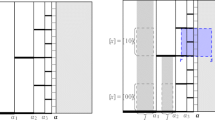Abstract
The paper studies randomness extraction from sources with bounded independence and the issue of independence amplification of sources, using the framework of Kolmogorov complexity. The dependency of strings x and y is dep(x,y) = max {C(x) − C(x |y), C(y) − C( y|x)}, where C(·) denotes the Kolmogorov complexity. It is shown that there exists a computable Kolmogorov extractor f such that, for any two n-bit strings with complexity s(n) and dependency α(n), it outputs a string of length s(n) with complexity s(n) − α(n) conditioned by any one of the input strings. It is proven that the above are the optimal parameters a Kolmogorov extractor can achieve. It is shown that independence amplification cannot be effectively realized. Specifically, if (after excluding a trivial case) there exist computable functions f 1 and f 2 such that dep(f 1(x,y), f 2(x,y)) ≤ β(n) for all n-bit strings x and y with dep(x,y) ≤ α(n), then β(n) ≥ α(n) − O(logn).
Access this chapter
Tax calculation will be finalised at checkout
Purchases are for personal use only
Preview
Unable to display preview. Download preview PDF.
Similar content being viewed by others
References
Barak, B., Impagliazzo, R., Wigderson, A.: Extracting randomness using few independent sources. In: Proceedings of the 36th ACM Symposium on Theory of Computing, pp. 384–393 (2004)
Barak, B., Kindler, G., Shaltiel, R., Sudakov, B., Wigderson, A.: Simulating independence: new constructions of condensers, ramsey graphs, dispersers, and extractors. In: Proceedings of the 37th ACM Symposium on Theory of Computing, pp. 1–10 (2005)
Bienvenu, L., Doty, D., Stephan, F.: Constructive dimension and Turing degrees. Theory Comput. Syst. 45(4), 740–755 (2009)
Bourgain, J.: More on the sum-product phenomenon in prime fields and its applications. International Journal of Number Theory 1, 1–32 (2005)
Calude, C.: Information and Randomness: An Algorithmic Perspective, 2nd edn. Springer, Heidelberg (2002); 1st edn. (1994)
Chor, B., Goldreich, O.: Unbiased bits from sources of weak randomness and probabilistic communication complexity. SIAM Journal on Computing 17, 230–261 (1988)
Dodis, Y., Elbaz, A., Oliveira, R., Raz, R.: Improved randomness extraction from two independent sources. In: APPROX-RANDOM, pp. 334–344 (2004)
Dodis, Y., Oliveira, R.: On extracting private randomness over a public channel. In: Arora, S., Jansen, K., Rolim, J.D.P., Sahai, A. (eds.) RANDOM 2003 and APPROX 2003. LNCS, vol. 2764, pp. 252–263. Springer, Heidelberg (2003)
Downey, R., Hirschfeldt, D.: Algorithmic randomness and complexity. Springer, Heidelberg (2010)
Fortnow, L., Hitchcock, J., Pavan, A., Vinodchandran, N., Wang, F.: Extracting Kolmogorov complexity with applications to dimension zero-one laws. In: Bugliesi, M., Preneel, B., Sassone, V., Wegener, I. (eds.) ICALP 2006. LNCS, vol. 4051, pp. 335–345. Springer, Heidelberg (2006)
Hitchcock, J., Pavan, A., Vinodchandran, N.: Kolmogorov complexity in randomness extraction. In: Electronic Colloquium on Computational Complexity (ECCC) (09-071) (2009)
Li, M., Vitanyi, P.: An introduction to Kolmogorov complexity and its applications, 3rd edn. Springer, Heidelberg (2008); 1st edn. (1993)
Miller, J.: Extracting information is hard: a Turing degree of non-integral effective Hausdorff dimension. Advances in Mathematics (2008) (to appear)
Nies, A., Reimann, J.: A lower cone in the wtt degrees of non-integral effective dimension. In: Proceedings of IMS workshop on Computational Prospects of Infinity, Singapore (2006) (to appear)
Rao, A.: Extractors for a constant number of polynomially small min-entropy independent sources. In: Proceedings of the 38th ACM Symposium on Theory of Computing, pp. 497–506 (2006)
Rao, A., Zuckerman, D.: Extractors for three uneven-length sources. In: Goel, A., Jansen, K., Rolim, J.D.P., Rubinfeld, R. (eds.) APPROX and RANDOM 2008. LNCS, vol. 5171, pp. 557–570. Springer, Heidelberg (2008)
Raz, R.: Extractors with weak random seeds. In: Gabow, H.N., Fagin, R. (eds.) STOC, pp. 11–20. ACM, New York (2005)
Reimann, J.: Computability and fractal dimension. Tech. rep., Universität Heidelberg (2004) (ph.D. thesis)
Santha, M., Vazirani, U.: Generating quasi-random sequences from semi-random sources. Journal of Computer and System Sciences 33, 75–87 (1986)
Shen, A.: Algorithmic information theory and Kolmogorov complexity. Tech. Rep. 2000-034, Uppsala Universitet (December 2000)
Trevisan, L., Vadhan, S.: Extracting randomness from samplable distributions. In: Proceedings of the 41st IEEE Symposium on Foundations of Computer Science, pp. 32–42 (2000)
Vereshchagin, N.K., Vyugin, M.V.: Independent minimum length programs to translate between given strings. Theor. Comput. Sci. 271(1-2), 131–143 (2002)
Zimand, M.: Extracting the Kolmogorov complexity of strings and sequences from sources with limited independence. In: Proceedings 26th STACS, Freiburg, Germany, February 26-29 (2009)
Zimand, M.: Two sources are better than one for increasing the Kolmogorov complexity of infinite sequences. In: Hirsch, E.A., Razborov, A.A., Semenov, A., Slissenko, A. (eds.) CSR 2008. LNCS, vol. 5010, pp. 326–338. Springer, Heidelberg (2008)
Zimand, M.: On generating independent random strings. In: Ambos-Spies, K., Löwe, B., Merkle, W. (eds.) CiE. LNCS, vol. 5635, pp. 499–508. Springer, Heidelberg (2009)
Zvonkin, A., Levin, L.: The complexity of finite objects and the development of the concepts of information and randomness by means of the theory of algorithms. Russian Mathematical Surveys 25(6), 83–124 (1970)
Author information
Authors and Affiliations
Editor information
Editors and Affiliations
Rights and permissions
Copyright information
© 2010 Springer-Verlag Berlin Heidelberg
About this paper
Cite this paper
Zimand, M. (2010). Impossibility of Independence Amplification in Kolmogorov Complexity Theory. In: Hliněný, P., Kučera, A. (eds) Mathematical Foundations of Computer Science 2010. MFCS 2010. Lecture Notes in Computer Science, vol 6281. Springer, Berlin, Heidelberg. https://doi.org/10.1007/978-3-642-15155-2_61
Download citation
DOI: https://doi.org/10.1007/978-3-642-15155-2_61
Publisher Name: Springer, Berlin, Heidelberg
Print ISBN: 978-3-642-15154-5
Online ISBN: 978-3-642-15155-2
eBook Packages: Computer ScienceComputer Science (R0)




